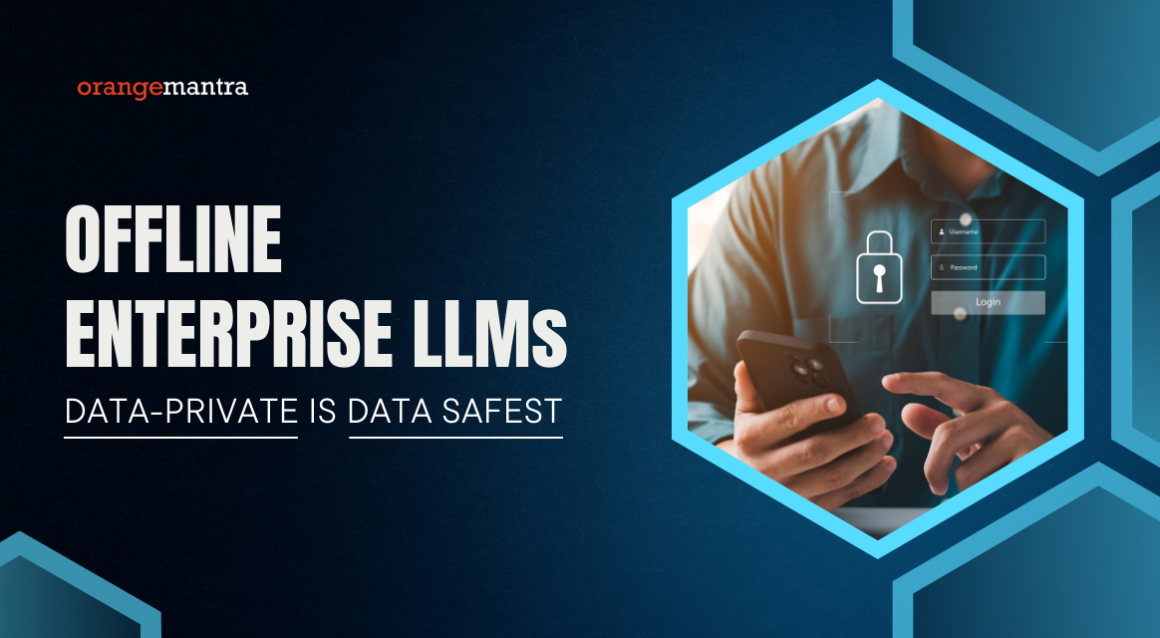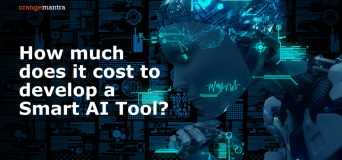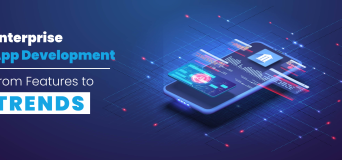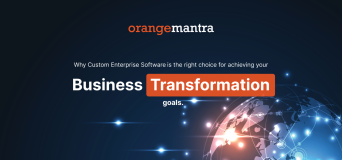No business wants a bad reputation.
No business wants to lose trust.
No business wants disruptions.
No business wishes to face legal or regulatory repercussions.
No business wants to lose their intellectual properties.
But a single instance of data mishandling, and all hell break loose, harming your brand and business painstakingly built over the years, if not decades, and inflicting damage that will take years to recover.
This is because data, which was already being termed as the new gold, is witnessing exponentially skyrocketing value even further after the advent of AI.
Now, everyone wants to get their hands on high-quality real-world data to train their AI model. So, the instant you go online, you are exposed to these threats.
What to do? Go offline?
Yes, but without losing your edge.
We are talking about offline, data-private LLMs that are exactly the need of the hour. And in this blog, we will discuss everything about them.
Table of Contents
Let’s First Understand the Scenario: Why is Data so Important?
From the 1970s when relational databases entered the market, several technological advancements have emerged with each making it easier to store and manage data. They encourage businesses to adopt a more and more data-centric approach, and why not. After all, data never lies.
It makes business operations and decision-making more focused, impactful and fruitful by refining each business component. For instance:
- Personalizing their product and/or service and their marketing to better serve their customer.
- Drawing insights for better operations, sharp decision-making and gaining a market edge.
- Lastly, helping them in risk management with effective fraud detection and risk assessment.
And now since the AI has entered the scene, businesses are vying for as much data collection as possible. Reason, the technology is data intensive. First, it is immensely capable of processing extensively large volumes of data and helps business tap into this new gold. AI can draw some seriously deep insights that make a huge difference in the market.
Second, it requires data to train and improve AI models, making them intelligent.
Hence, we are in a world where data generation and data collection are at an all-time high. To an extreme level that your every interaction is being tracked can lead to some serious consequences as we will see in the next section.
Consequences of A Single Instance of Data Compromise
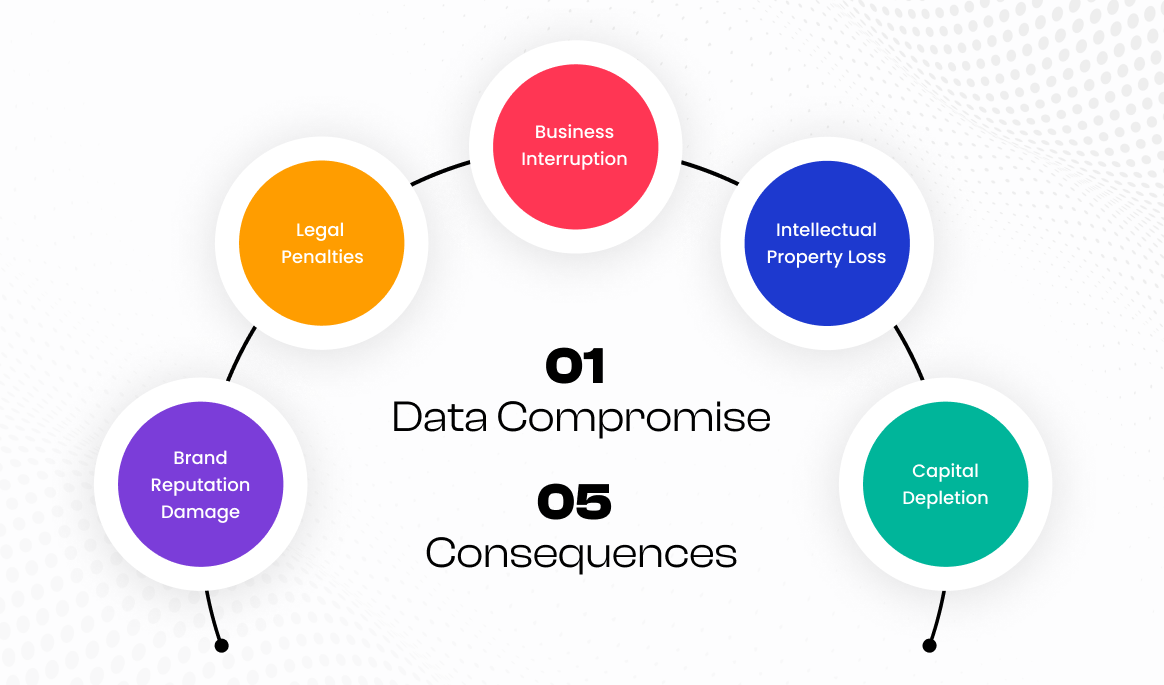
Everyone is out to get the data. The devices you use, the software you install or the tools you deploy everything captures data in one or the other way.
On top of it, the race to AI adoption has further exacerbated the situation. One on hand, there has been stream of new AI solutions, and on the other, business is readily deploying these solutions so that they do not miss out on the amazing opportunities and competitive advantage.
But here, they are really missing out on data security. Here, just takes the example of ChatGPT, the tool that ushered in the AI era.
OpenAI’s privacy policy itself states that they may share users’ personal information with unspecified parties to meet business needs, without informing users.
Moreover, there are questions around the legal basis for collecting and using people’s personal
data to train ChatGPT, which may violate GDPR regulations in Europe.
This fierce data collection can lead to certain unwanted consequences. One single data breach is enough.
Reputation Damage and Loss of Trust
The most evident damage a business sustains is to its reputation.
Data breach puts a dent on the brand through negative publicity and media coverage, tarnishing the long-term customer perception and that of the employees.
Also, the business loses trust and strains your relationship with your customers, employees, suppliers and stakeholders, who may also be affected. Now, they no longer believe in the company’s ability to protect their data.
Moreover, if your data breach leads to the exposure of employees’ and customers’ personal information causing identity theft and fraud.
This results in increased customer churn and employee dissatisfaction, hitting the business hard.
Legal and Regulatory Repercussions
This one is the immediate effect. You don’t just bear the loss of your data and stakeholders’ trust, but you face hefty fines for non-compliance with data protection regulations (e.g., GDPR, CCPA).
Worse, in some cases, the affected parties may even file lawsuits, leading to additional legal expenses and settlements.
Operational Disruption
Next, your business also faces downtime as data loss disrupts business operations, causing delays in services and production. And now, you also need to mobilize significant resources and time are required to recover lost data and restore normal operations. Also, your internal processes may need to be overhauled, affecting efficiency and workflow.
Further, if that data breach leads to employee dissatisfaction, it also affects your operations. Data loss can affect employee morale and productivity, especially if it leads to job insecurity.
Lastly, data breach can also lead to supply chain interruption due to the disruption in data flow, leading to delays and increased costs.
Loss of Intellectual Property
Data leaks in your system can also compromise your proprietary data, trade secrets, and intellectual property. Loss of research and development data can delay or halt innovation projects, weakening your competitive position.
Financial Loss
Next, there is the obvious loss of financial resources. Here you would face brunt on two fronts, direct costs and indirect costs. Direct costs are the expenses related to investigating the breach, notifying affected parties, legal fees, and regulatory fines. Plus, you may need to face the increased demand for customer support to address concerns and manage the aftermath.
The indirect costs would mean the loss of revenue due to operational downtime, decreased sales, and potential loss of customers.
Why Offline LLMs Are the Right Approach for AI Business Adoption?
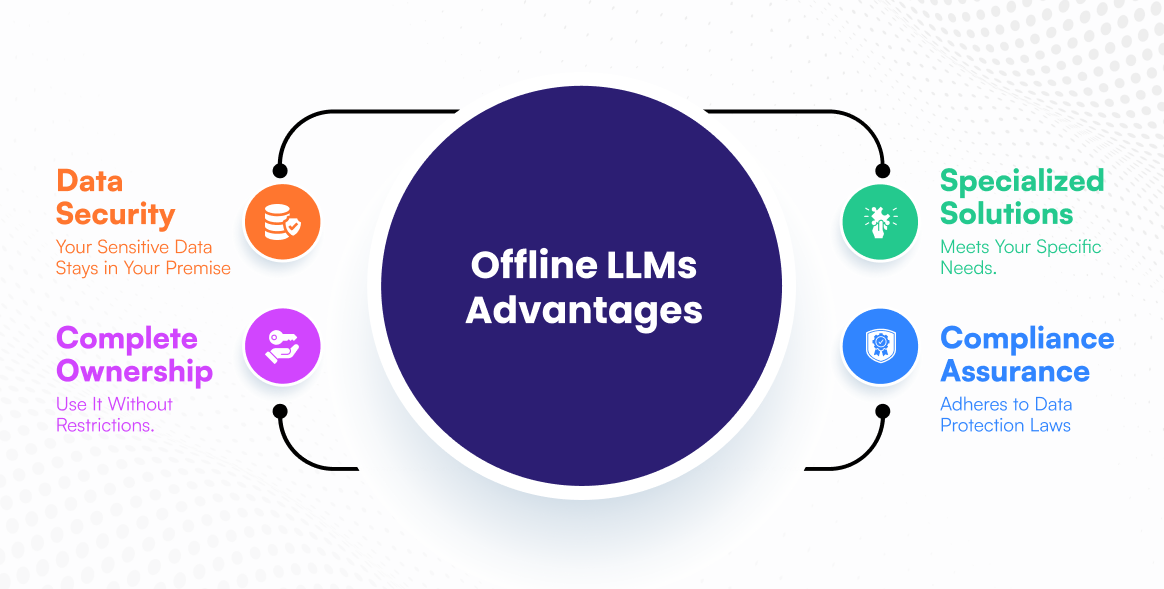
This is because LLMs operate entirely offline, meaning your data stays safely stored on your servers and never leaves your enterprise.
Plus, they are completely customizable to meet the need of your enterprise needs, helping you stay compliant with the data protections regulation. And to top it all you get full ownership of your LLM.
Let’s cover each of these aspects one-by-one. Starting with the offline aspect, this isolation allows you to retain full control and ownership over your data. This means you can manage, access, and utilize your data without external interference while reducing the risk of data breaches or leaks by keeping your business strategies and decisions confidential.
This brings you a complete peace of mind that your sensitive information is safe, and you are in control.
Next, the customizability of offline LLMs meets the specific needs of your company and delivers business-specific and industry-specific solutions. Whether you’re in finance, healthcare, or agriculture, LLMs are built to align with your unique requirements, ensuring that it understands and responds accurately to your data.
Lastly, by keeping data processing within your enterprise environment, you ensure that your practices align with the legal requirements, mitigating the risk of regulatory breaches. You stay compliant and avoid hefty fines in an era of stringent data protection regulations such as GDPR and CCPA.
Ok, now, enough on the challenges side. What about the opportunities? Let’s explore what offline LLMs bring to the table for you.
How Useful are Offline LLMs – Very
Offline LLMs are more than just a secure data solution by preventing unauthorized access to your data. They are also equally competent, if not more, as any online LLM models in the market to aid in business operations and growth. Here are the other benefits of opting offline LLMs:
No Internet, No Problem
This one is very obvious, they are offline, hence they can operate without internet connectivity. So even if your business requirements involve operating from remote areas where reliable internet is unavailable, you would not face any issue.
The Way You Need
Offline LLMs have immense scope of customization and relevance for particular business tasks. In fact, customization is the second most important and obvious feature of these models as they are meant to operate without any over-the-internet assistance. They are created in a way to cater to all the needs of an organization on their own. So, before they are deployed in your environment, they are tailored to your specific business requirements.
No Recurring Cost Burden
You have the full ownership of your offline LLMs. This means you just need to pay once and offline LLMs is your forever.
There is no need to incur ongoing subscription cost every now and the as we see in other cloud-based models. Thus, helping you save a lot of time and costs. leading to long-term cost savings3.
Less Censorship
This one is important, full ownership, you have the freedom to discuss even the most sensitive or thought-provoking subjects without any censorship.
This is not the case with the public-facing alternatives as they need to be made more restrictive and sensitive.
For example, if you need to discuss the ethical implications of genetic engineering or the nuances of political ideologies. Then offline LLM can freely explore and discuss all perspectives, including the ones considered too sensitive or that may cause controversies when discussed in public.
On the other hand, with public-facing LLMs, you might find that certain terms or ideas are flagged or filtered out. To your frustration, the model might keep providing only neutral or generalized responses, avoiding any potentially controversial viewpoints.
This does not mean that these restrictions should not be there. They are important to ensure compliance with platform guidelines, protect against misinformation, or prevent the spread of harmful content, but it can limit the depth and breadth of discussion that your business might need to solve the very problem in the first place.
Why Choose Our AIBI – Offline Tool for Data Visualization and Predictive Analytics
We have created an offline data visualization tool named AIBI. It uses state-of-the-art LLMs to not only manage your organizational data but also draw out deep insights to differentiate your businesses.
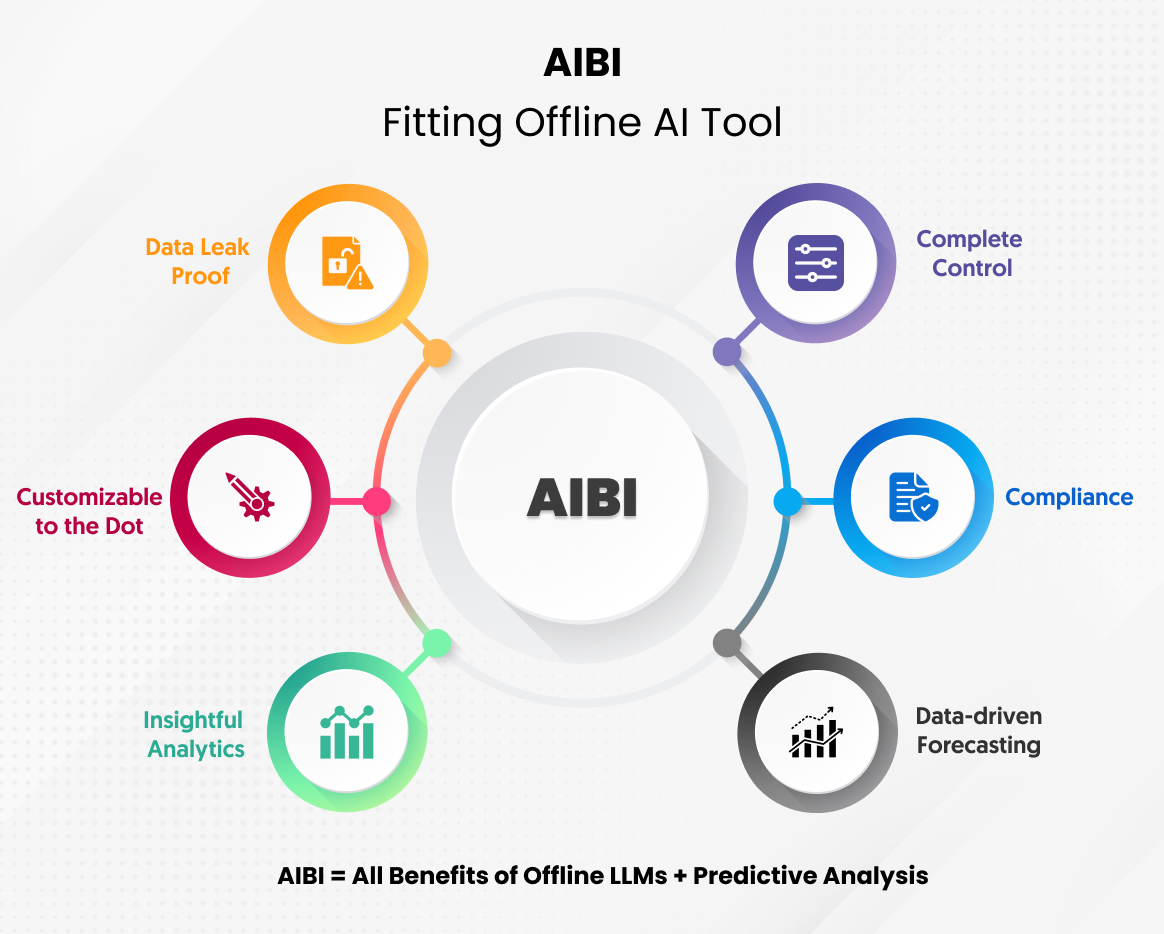
Here is how it helps:
Data-driven Forecasting
You can feed your historical data in our offline tool and ask it to analyze it. In the secure environment of your organization, AIBI will provide precise forecasts and trend analyses to inform your decisions without compromising data privacy.
Insightful Analytics
AIBI will generate actionable insights from your data after making an in-depth analysis of any data that you wish to share with it. Thus, it will reduce your time and burden and help you understand patterns, risks, and opportunities
Fluid Integration
We have created AIBI in a way to integrate with your existing systems and workflows without disturbance. Whether it’s for financial forecasting, healthcare diagnostics, or supply chain management, AIBI works in harmony with your data ecosystem.
Full Customization
We have made AIBI moldable so that it is perfect for your specific industry, business as well as individual needs. It will find relevant and accurate insights having a direct and significant impact on your business efficiency.
Complete Compliance
AIBI is developed to ensure data practices align with regulatory standards, avoiding potential legal issues. By operating offline, you can process and analyze sensitive data without exposing it to external networks or cloud services, significantly reducing the risk of data breaches and unauthorized access. This approach addresses critical pain points for businesses in data-sensitive industries, such as healthcare providers analyzing patient records without compromising confidentiality or violating HIPAA regulations.
Absolute Control
As we already discussed above, AIBI gives you full control and ownership so you can explore any topic and any aspect without any censorship. This brings a direct edge to your business over the competitors who have chosen online LLMs.
Conclusion
In conclusion, offline, data-private LLMs represent a significant leap forward in safeguarding enterprise data while leveraging the power of Artificial Intelligence. By choosing this approach, you not only enhance your capabilities but also uphold the highest standards of data privacy and security. Embrace the future of data-driven decision-making with confidence, knowing that your sensitive information remains protected within your own systems.
Know more about AIBI, a unique product to lead the market. Click Here
FAQs
What are offline, data-private LLMs?
Offline, data-private LLMs are AI language models that operate entirely within an organization’s own servers. This way, your organizational data stays safe on a device in your premise with complete security.
How do offline LLMs benefit businesses?
Offline LLMs contribute in multiple ways:
- they ensure complete data security,
- are completely customizable as per business and industry
- help in regulatory compliance,
- Provide full control over data processing without internet connectivity.
What is AIBI and how does it help businesses?
AIBI is an offline data visualization tool that uses LLMs for data management and insight generation. It offers data-driven forecasting, insightful analytics, and seamless integration with existing systems.
How do offline LLMs address data privacy concerns?
By processing data locally, offline LLMs significantly reduce the risk of data breaches, unauthorized access, and compliance issues associated with data protection regulations like GDPR and CCPA.
Are offline LLMs as capable as online models?
Yes, offline LLMs can be just as competent as online models. They offer customization for specific business needs, unrestricted exploration of topics, and can operate without internet connectivity.
